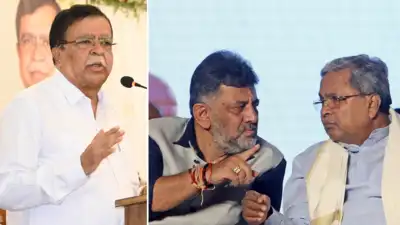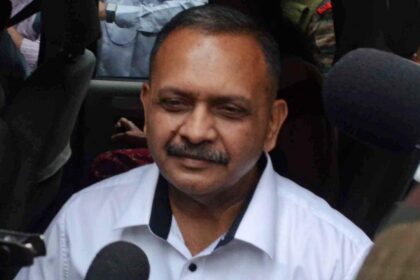The Political Spark: Rahul Gandhi’s “Vote Theft” Allegations and the Congress Dilemma
The recent political landscape in India has been marked by a sharp exchange of statements, internal disagreements, and a growing sense of unease within the Congress party. At the center of this latest controversy stands Congress leader Rahul Gandhi, whose public remarks alleging large-scale “vote theft” during recent elections have ignited a heated debate. While his comments were aimed at exposing alleged irregularities and rallying party supporters, they have also drawn criticism from unexpected quarters — including members of his own party.
One such voice is that of a senior Congress MLA from Karnataka, whose candid remarks have added fuel to the discussion. The legislator publicly chided Rahul Gandhi, cautioning that making “vote chori” (vote theft) claims without solid, indisputable evidence could backfire. According to the MLA, such statements risk painting the party as a sore loser rather than a credible political force committed to democratic principles.
Why the Remarks Matter
This is not just an isolated incident of intra-party disagreement. In politics, messaging is as important as policy, and in the age of social media, a single phrase can take on a life of its own. Rahul Gandhi’s “vote theft” allegations were picked up by news outlets and political rivals almost instantly, leading to sharp rebuttals from the ruling party and ridicule from opposition commentators. For Congress, which is already battling the perception of electoral underperformance, this added friction could be costly.
The Karnataka MLA’s public stance underscores a deeper strategic concern: allegations of electoral malpractice are serious and, if unproven, can undermine a party’s moral high ground. Instead of inspiring public confidence, they might reinforce doubts about the party’s ability to win elections through positive campaigning.
The Historical Context
This is not the first time Indian politics has been shaken by claims of electoral manipulation. From the “booth capturing” controversies of earlier decades to more recent debates over electronic voting machines (EVMs), the integrity of elections has often been a flashpoint. In each case, the political repercussions have depended largely on how well parties could substantiate their claims and present themselves as defenders of democratic fairness.
For Rahul Gandhi, invoking “vote theft” may have been an attempt to connect with grassroots anger and portray the party as a champion of electoral justice. However, critics within the party argue that without a watertight case supported by verifiable data, such rhetoric risks alienating moderate voters and energizing opponents.
Congress’s Internal Balancing Act
The MLA’s intervention reveals the tightrope Congress must walk. On one hand, the party wants to project strength and challenge what it sees as electoral irregularities. On the other, it must maintain a reputation for political maturity and responsibility. The Karnataka legislator’s remarks reflect an awareness that every public statement from the party’s leadership will be dissected and weaponized in the political arena.
As Congress prepares for upcoming state and national contests, internal unity will be crucial. A divided front not only weakens electoral performance but also provides opponents with easy talking points. The challenge now is whether the party leadership can harmonize its messaging — balancing the need for political aggression with the discipline of evidence-based claims.
The Congress MLA’s public response to Rahul Gandhi’s “vote theft” remarks was not just a passing comment—it was a calculated statement delivered in the full glare of political scrutiny. In a political culture where dissent within party ranks is often muted or addressed behind closed doors, this move was significant. It suggested that the legislator was willing to risk potential displeasure from the central leadership to voice what he believed was a necessary course correction.
The MLA’s Political Profile
The Karnataka MLA in question is no political lightweight. With multiple electoral victories under his belt and deep connections in both rural and urban constituencies, he is viewed as a seasoned political operator who understands the pulse of the electorate. His career has been built on a combination of grassroots outreach, regional political savvy, and an ability to navigate party hierarchies without alienating key power centers.
Colleagues often describe him as pragmatic rather than ideological — someone who values political credibility and voter trust over short-term sound bites. This makes his comments about Rahul Gandhi’s approach especially noteworthy. It wasn’t just a critique of a single statement; it was a pointed reminder that political battles are won not just through fiery rhetoric, but through careful strategy and sustained credibility.
Underlying Motivations
While it’s tempting to frame the MLA’s remarks purely as an act of internal rebellion, the motivations are likely more complex. Several factors may have influenced his decision:
- Preserving the Party’s Image
The MLA understands that elections are as much about perception as they are about policy. Accusations of “vote theft,” if not substantiated, could reinforce the BJP’s narrative that Congress is making excuses for repeated losses. By urging caution, the MLA is positioning himself as a voice of reason within the party. - Regional Political Dynamics
Karnataka politics operates differently from the national stage. Voters in the state tend to prioritize tangible governance outcomes — infrastructure, agricultural support, employment — over purely ideological battles. The MLA may fear that excessive focus on national-level controversies could dilute Congress’s local messaging. - Personal Political Capital
With a loyal voter base to maintain, the MLA cannot afford to be tied too closely to statements that may polarize or alienate constituents. By publicly articulating a balanced viewpoint, he may be safeguarding his own electoral viability.
A Strategic Disagreement, Not a Personal Attack
It is important to note that the MLA’s remarks were not delivered in a tone of personal animosity toward Rahul Gandhi. Instead, they were couched in terms of political effectiveness and electoral strategy. This distinction matters, especially in a party that has historically struggled with managing internal differences without fragmenting.
Observers suggest that the MLA’s approach may also be an attempt to influence the party’s central leadership without directly challenging its authority. By framing his critique in terms of electoral consequences, he keeps the focus on the party’s collective success rather than on individual ambitions.
The National Impact
The MLA’s comments, though regionally rooted, have national implications. They highlight the tensions between the Congress’s central leadership and its state-level heavyweights, a recurring theme in the party’s modern history. Such moments of public divergence, while uncomfortable, can sometimes force a party to reassess its strategies and sharpen its messaging.
However, they can also embolden opponents, who seize on such episodes as evidence of disunity. The BJP and other rivals have already begun weaving the MLA’s remarks into their own political narratives, suggesting that even Congress insiders doubt Rahul Gandhi’s leadership instincts.
When assessing the significance of the Karnataka Congress MLA’s public disagreement with Rahul Gandhi, it’s impossible to ignore the historical patterns that have shaped the party’s trajectory. The Indian National Congress, with its century-long legacy, has been no stranger to internal dissent. In fact, some of the most defining moments in its history have been triggered by ideological splits, personality clashes, and strategic disagreements.
The Long Shadow of Internal Division
From the early 20th century, the Congress has operated as a broad tent, housing multiple ideological streams — from left-leaning socialists to market-friendly liberals, from staunch secularists to moderate religious voices. While this diversity has often been a source of strength, it has also meant that unity requires constant negotiation.
Notable rifts include:
- The 1969 Split – Prime Minister Indira Gandhi’s conflict with the party’s old guard (the “Syndicate”) led to a decisive break, giving rise to Congress (O) and Congress (R).
- The 1977 Crisis – After the Emergency, internal dissatisfaction combined with public discontent to produce a historic defeat, forcing the party into an introspective phase.
- The 1990s Erosion – In the era of coalition politics, multiple state-level leaders began asserting more autonomy, weakening the central leadership’s hold.
These episodes underline a recurring truth: when the central narrative of the party fails to align with the regional realities, cracks begin to widen.
Patterns That Resonate Today
The Karnataka MLA’s critique of Rahul Gandhi echoes several past scenarios where regional leaders voiced strategic concerns over national rhetoric. Historically, such warnings have either been:
- Dismissed as Political Dissent, leading to alienation of influential leaders and, in some cases, defections.
- Taken as Constructive Feedback, prompting mid-course corrections in strategy that revived the party’s fortunes.
The current situation bears the risk of the first outcome unless the Congress high command demonstrates an openness to dialogue and adaptability.
The ‘High Command’ Problem
One persistent challenge for Congress has been its “high command culture,” where decision-making authority is heavily centralized in Delhi. While this model can ensure uniformity in messaging, it often sidelines state leaders who have intimate knowledge of local political nuances.
This tension between central authority and state-level autonomy has, in many ways, defined the Congress’s internal politics for decades. The Karnataka MLA’s remarks may be seen as a fresh reminder that state leaders are demanding a greater voice in shaping the party’s national stance.
Strategic Lessons from History
Looking back at similar episodes, a few key lessons emerge:
- Engage with Dissent – Leaders who ignored early warnings often paid the price in subsequent elections.
- Balance National and Local Messaging – Rhetoric that resonates in one region may alienate voters in another; successful campaigns have found a middle path.
- Protect Public Unity – Even when disagreements exist, framing them in ways that do not signal deep division to the public is crucial to maintaining credibility.
Potential for Course Correction
If the Congress leadership treats the MLA’s remarks as a genuine call for strategic refinement, this moment could be a turning point rather than a crisis. By fostering a culture where regional leaders can express concerns without fear of reprisal, the party could strengthen both its internal cohesion and its public image.
However, history also warns that if such dissent is met with defensiveness or indifference, it could deepen the perception of disconnection between the central leadership and its state-level representatives — a perception that rival parties will eagerly exploit.
The phrase “vote theft” is politically explosive in any democratic context, but in India — where electoral integrity is central to the legitimacy of governance — such allegations resonate with heightened sensitivity. When Rahul Gandhi used this phrase, he was tapping into a narrative that appeals to his core supporters but also risks alienating undecided voters. The Karnataka MLA’s objection highlights why such rhetoric, while potent, can be a double-edged sword.
The Political Context of the Remark
Rahul Gandhi’s “vote theft” allegation was made against the backdrop of heightened electoral competition and accusations of manipulation in various state-level contests. His statement seemed to be aimed at energizing party workers and framing the ruling party — the BJP — as undermining democratic norms.
However, in politics, timing and delivery are everything. The remark came at a moment when Congress was attempting to consolidate its messaging ahead of critical state elections. This meant that even minor missteps in rhetoric could have disproportionate consequences.
Rhetorical Power vs. Electoral Risk
From a purely rhetorical standpoint, “vote theft” is a phrase that:
- Creates an immediate emotional reaction.
- Positions the speaker as a defender of democracy.
- Frames the opponent as morally and legally corrupt.
But such a high-impact phrase also:
- Raises the stakes of proof — voters will expect tangible evidence, and if it isn’t forthcoming, the claim risks being dismissed as exaggerated or opportunistic.
- Shifts focus from policy to accusation — this can limit a campaign’s ability to project constructive visions.
- May alienate neutral voters — those not fully aligned with either party may see the statement as unnecessarily confrontational.
Internal Pushback: Why the MLA Spoke Out
The Karnataka Congress MLA’s public disagreement with Rahul Gandhi’s remark was not simply about tone — it was about electoral strategy. In Karnataka, where Congress is currently in a competitive posture, such strong allegations might:
- Distract from local governance achievements that the party could showcase.
- Risk backlash among voters who prefer issue-based campaigning.
- Provide BJP with ammunition to portray Congress as obstructionist rather than solution-oriented.
From the MLA’s perspective, the cost-benefit calculation of using “vote theft” in speeches may not work in the party’s favor in his state’s political climate.
The Larger Communication Challenge
Political messaging is rarely one-size-fits-all. A phrase that works in Uttar Pradesh or Delhi might not resonate — or could even backfire — in Karnataka, Tamil Nadu, or Maharashtra. Congress’s challenge lies in adapting its national rhetoric to state-specific voter sensibilities without diluting the central message.
This is where the “high command vs. state leadership” friction resurfaces. Rahul Gandhi’s remark illustrates how centralized message crafting can inadvertently clash with regional electoral strategies.
Strategic Recommendations for Congress
- Substantiate Strong Claims – If accusations of “vote theft” are to be part of the narrative, they must be backed by documented cases and credible third-party reports.
- Pair Criticism with Solutions – Every allegation should be followed by a concrete policy proposal to restore voter faith in institutions.
- Empower State Leaders in Messaging – Allow them to adapt national talking points to local contexts.
- Focus on Dual Narratives – Combine accountability messaging with development-oriented pitches to broaden appeal.
Potential Long-Term Effects
Handled poorly, the “vote theft” remark could deepen internal divisions and distract from issue-based campaigning. Handled well — with evidence, nuance, and coordinated messaging — it could solidify Congress’s position as a watchdog of democracy.
The choice between these outcomes depends on how swiftly and strategically the party manages both external optics and internal consensus.
The political landscape surrounding Rahul Gandhi’s “vote theft” remark did not remain static for long. Once the statement gained traction, both the Bharatiya Janata Party (BJP) and other political forces seized the opportunity to respond, framing the remark — and the Karnataka MLA’s public disagreement — in ways that served their respective agendas.
BJP’s Immediate Response
The BJP was quick to pounce on the controversy. Its communication machinery treated Rahul Gandhi’s remark as a self-inflicted wound for Congress, amplifying the MLA’s criticism to suggest that even Congress insiders doubted their leader’s judgment.
In public addresses and social media campaigns, BJP leaders framed the incident as:
- Evidence of a divided Congress — portraying the party as internally fractured and unable to present a unified vision.
- A sign of political desperation — claiming that Congress was resorting to baseless allegations because it lacked policy achievements to showcase.
- An insult to democratic institutions — accusing Rahul Gandhi of undermining voter confidence in India’s electoral system without sufficient proof.
By doing so, BJP effectively shifted the debate away from governance shortcomings and toward Congress’s rhetorical strategy — a space where BJP often excels in turning defense into offense.
Leveraging the MLA’s Statement
The Karnataka MLA’s open criticism became a key talking point for BJP in the state. BJP spokespersons repeatedly quoted him to drive home three narratives:
- Congress leaders themselves reject Rahul Gandhi’s claims.
- State-level Congress leadership is being sidelined by a disconnected high command.
- Karnataka deserves issue-based politics, not what BJP termed “imported controversies” from Delhi.
This tactic was particularly potent in Karnataka, where voters often respond strongly to leaders who prioritize state-specific concerns over national party lines.
Other Opposition Parties’ Calculated Silence
Interestingly, many other opposition parties — especially those in the INDIA alliance — reacted with measured restraint. While they refrained from openly criticizing Rahul Gandhi, they also avoided publicly endorsing his “vote theft” phrase. This silence was strategic:
- Avoiding BJP’s framing trap – openly supporting the remark could have invited BJP attacks across multiple parties.
- Preserving flexibility – smaller parties wanted room to adapt their own electoral narratives without being tied to a potentially polarizing phrase.
In some cases, regional leaders privately agreed with the Karnataka MLA’s assessment, but chose to convey their feedback within closed-door alliance meetings rather than in public forums.
Media’s Role in Amplification
The media played a pivotal role in magnifying the story. National television debates ran split-screen visuals of Rahul Gandhi’s speech alongside the MLA’s rebuttal, creating an impression of disunity. Digital platforms carried headline-friendly soundbites, while op-ed writers explored the internal power dynamics at play within Congress.
For BJP, this was an amplification windfall — every news cycle focused on Congress’s communication missteps was one less day spent scrutinizing BJP’s governance record.
The Narrative Chessboard
In political communications, perception often trumps fact. Whether or not Rahul Gandhi’s “vote theft” remark had factual basis became less relevant than how the remark was perceived and framed.
BJP’s mastery of quick-response narrative shaping allowed it to:
- Recast the controversy as a referendum on Congress’s credibility.
- Widen perceived rifts between Congress’s central and state leadership.
- Occupy the offensive position while forcing Congress into a defensive stance.
Congress’s Strategic Dilemma
At this point, Congress faced two difficult options:
- Stand Firm – Double down on the “vote theft” narrative, present supporting evidence, and risk further pushback if proof is deemed insufficient.
- Pivot the Narrative – Quietly retire the phrase and shift focus to development, governance, and state-level achievements.
Both options carried risks. Standing firm risked prolonging the controversy; pivoting risked being perceived as a retreat.







